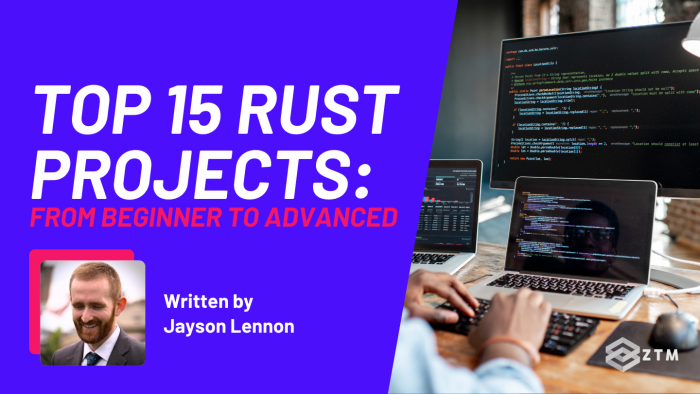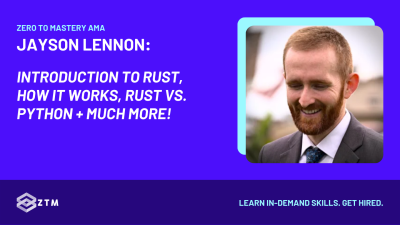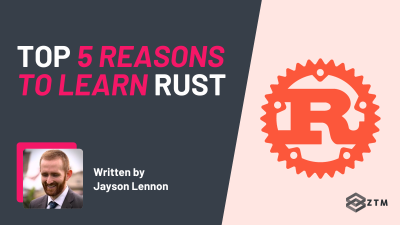
In This Post:
Are you a beginner to intermediate Rust programmer that’s looking to hone your skills and truly understand the language?
Well, one of the most effective ways to learn Rust, or any programming language for that matter, is to build projects.
Studies have proven that this hands-on approach helps you solidify your knowledge and gain practical experience.
The thing is, you don’t want to just build any old projects.
You want to be both strategic in what you learn, and how you approach them, and as the resident Rust Instructor here at the ZTM Academy, I've found that juniors learn best by starting to build projects with guidance and code examples.
However, you can't be a junior forever (nor would you want to be!).
That's why you'll want to transition to building projects from scratch (as quickly as possible), without needing to rely on detailed instructions, to help you progress to intermediate and expert levels.
And that’s the goal of this guide. To give you a series of projects that will walk you through and then stretch your skills until you have a kick-ass Rust project portfolio.
Here’s how it works:
I’ve broken this down into 3 sections.
- Beginner projects which have extra instructions and links to similar projects so that you can follow along and build the projects
- Intermediate projects for you to build and figure out for yourself (with the help of a few hints)
- Advanced projects for you to do on your own, from scratch, with very limited instructions
Will this be harder and more frustrating for you than it would be if you just had instructions to follow? Yes, but that's the point!
Trust me on this. The struggle is where you learn the most, because it’s where you start to apply theory and knowledge.
It’s not a bad thing to struggle either, because this struggle to figure things out is the most accurate representation of the workplace, and even the best Rust developers struggle and have to think through problems (that's what you get paid the big bucks for!).
But rest assured that these projects will help you become a better Rust developer, whether you are starting out as a new developer or are an experienced Rust developer looking to dig deeper.
Sidenote: Each project has a brief description along with a list of crates to help you make the project. If you want to challenge yourself, complete the "extra features" section to give yourself some more practice.
Before we begin - some foundation crates
The Rust standard library is light on features, so here are some foundation crates that are great to use in nearly any project:
- thiserror (Make custom error types)
- color-eyre (Report application errors)
- clap (Process command line arguments)
- serde (Serialize and de-serialize data structures)
Beginner Rust Projects
OK so let’s get into these and start nice and simple. These beginner Rust projects are great for developers who are starting out with programming, but they’re also good for experienced developers who are just starting to play around with Rust.
Why?
Well, each of these projects focus on a single, well-defined task, making them great for new developers. Whereas for experienced developers starting to use Rust, these help to gain understanding of the workflows and idioms used in Rust.
I've included a link below each of these beginner projects. That link contains instructions on a project that is the same (or similar) to what I'm suggesting you build here. So if you're struggling with something check out the link.
But don't forget - the goal is for you to be able to build projects without needing detailed instructions, so try to think through the problem before you look at the instructions.
When we get to the intermediate and expert projects (and in the real world), you won't have instructions as a crutch to lean on!
#1. CLI Utilities

Command-line utilities are the gateway to learning any programming language. They have simplified input and output systems which makes the code less complex to write. This allows you to focus on the problem at hand and learn Rust instead of learning a specific problem domain.
Rewriting existing tools in Rust can provide a great baseline to get started:
echo: repeats inputcat: concatenates filesls: lists directoriesfind: locates files or directoriesgrep: matches text in files
Other than the "foundation" crates listed at the beginning of this post, these projects don't need any extra crates.
Level up your skills and project by adding in these extra features:
- Add extra flags to the tools to enhance their feature set
- Use proper error handling so the programs don't end prematurely (no
.unwrap()and no.expect()) - Add multi-threading support.
findandgrepare good candidates for this - Add colorized output
Having trouble getting started? Check out this Rust coreutils rewrite which has many of the above tools written in Rust.
#2. Todo List

The humble todo list has become an unofficial first project when starting out with a new programming language. You can choose to use a CLI with clap, or make it interactive using the crates listed below. You can even do both!
The todo list minimal feature set includes:
- Add, remove, edit todos
- Mark todos as "done"
- Save and load todos
Here are some crates to get you started:
- console (Interface with terminal)
- dialoguer (Terminal user prompting)
- tui (Interactive terminal UI)
- rusqlite (Connect to SQLite databases)
Level up your skills and Todo List with these extra features:
- Make your project fully interactive
- Add
$EDITORsupport for editing todos - Save the todos into a database
Not sure how to start out with this project? Check out this CLI todo app.
#3. Budget Manager

A budget manager is a project that can be useful for keeping your finances in check, while also improving your Rust programming skills. Learning about databases is an important skill, and this project is a great entry point for databases thanks to its limited scope.
For an initial interface, you can use clap to handle CLI flags and arguments, but you can also go interactive using the crates listed later in this section.
The budget manager minimal feature set includes:
- Add, remove, edit a budget
- Add, remove, edit transactions associated with a budget
- Display how much money is remaining in a budget
- Handle more than one budget
Here are some crates to get you started:
- console (Interface with terminal)
- dialoguer (Terminal user prompting)
- tui (Interactive terminal UI)
- rusqlite (Connect to SQLite databases)
Level up your skills and your Budget Manager project with these extra features:
- Provide a web API to make changes to the budget
- Display a warning when the user is getting close to going over budget
- Allow budgets to be active for a specified time frame
- Generate reports summarizing expenditures in a given time frame
If you want to see an alternative of managing bills or budgets, take a look at this project.
#4. Unit Converter

A unit converter provides useful functionality, and is a nice way to get familiar with converting between different data types in Rust. An argument-based CLI using clap is a great starting point for this application.
Here are some crates to get you started:
Level up your skills and your Unit Converter project with extra features:
- Use new types for each unit
- Add conversion functionality using the
Fromtrait to make your code more robust - Add conversions for lots of units
- Add an "expression" option where the user can type a conversion expression
- Example:
10C -> Fwould convert 10° Celsius to Fahrenheit - If the units are ambiguous, display an error message showing potential matching units so the user can correct the expression
- Example:
There is an interactive implementation of a unit converter called rink-rs that you can browse the code for if you want to see how a unit converter can be built.
Intermediate Rust Projects
These intermediate Rust projects are great once you have a grasp of how Rust works and have completed some beginner projects.
Generally, each project has either more than one feature to manage, or use more complicated parts of the Rust language. Getting through these projects will increase your confidence and ability to program in Rust.
As you'll see, for these intermediate projects I'm not providing links to sites that provide instructions on how to build the project.
That's up to you to figure out. Building projects from scratch is an incredible learning experience, so embrace it!
#5. Social Media Bot

A social media bot is a fun project that can allow you to show off your skills. You could make a Discord bot to moderate your server, or a Reddit bot that replies with fun trivia, or even a Twitter bot that tweets some message based on a condition.
Here are some crates to get you started:
- reqwest (Make HTTP requests)
- serenity (Discord)
- kuon (Twitter)
- twitter-api (Twitter)
- reddit (Reddit)
Although I’ve not added a direct link to how to build this, a little detective work will set you on the right path if you get stuck.
Level up your skills & your Social Media Bot with extra features:
- Fully automate the bot
- Make a text adventure game where the bot responds to commands in the form of replies
- Connect the bot to an external event source: an API,
cronjob, or even a hardware project
#6. Metered API Server
APIs are great, and making money from them is even greater! Create a web-accessible API and track usage per API key. The API can do anything that is interesting to you.
There's no need to connect your API to a billing source. The important part is to get correct usage tracking and database planning.
The metered API server minimal feature set includes:
- Add/remove API keys
- Track the number of times each API key has made a request
- Associate API keys with user identity (email address, for example)
Here are some crates to get you started:
Level up your skills and your API Server with extra features:
- Generate usage reports per API key in any format you'd like
- Add support for usage quotas. This is great for tiered-usage.
- Add rate limiting to prevent API overuse
#7. Data Structures
Choosing the correct data structure is one of the most important tasks when creating programs. Writing your own data structure is a great way to gain a deeper understanding of how they work.
You could try creating an ordered HashMap, or a concurrent Queue, a binary search tree, or a persistent data structure.
Here are some crates to get you started:
- petgraph (Helps make graph data structures)
Level up your skills with extra features:
- Write a developer-friendly API to use your data structure
- Write documentation comments for the entire crate
- Benchmark your data structure against similar ones in the ecosystem
#8. Utility Billing System

This project is about creating a billing system for a utility company. It can be any utility that has metered usage. You'll need to support customer accounts, meter readings, generation of bills, and due dates.
The great thing about this project is you can start out using CLI and then transition it to a web-based system for an extra challenge.
The utility billing system minimal feature set includes:
- Managing customer accounts with CRUD operations
- Ingesting meter readings from an external service (CLI argument is fine for an initial implementation)
- Generate reports: usage, income
- Generate invoices
Here are some crates to get you started:
- sqlx (Connect to databases)
- console (Interface with terminal)
- dialoguer (Terminal user prompting)
- tui (Interactive terminal UI)
- axum (HTTP Server, general usage)
Level up your skills and your Billing System with extra features:
- Make it a web-based system instead of CLI
- Enable customers to create accounts and pay their bill
- Send notifications (email/SMS/push) to customers when their bill is due
- Allow customer to configure notifications (bill due, usage above threshold)
#9. Prescription Management System

Writing programs to handle medical information needs extra care to avoid security problems. This makes Rust's secure, reliable code the perfect fit for creating a prescription management system.
To help ensure correct operation, try using the type state pattern to encode the correct operation of the application into the type system.
The system should:
- Allow doctors to add prescriptions for patients
- Allow pharmacy personnel to note if the patient accepted or declined a consult
- Track number of refills based on what the doctor prescribed
- Have either a CLI using
clapor an interactive terminal interface of your own design
Here are some crates to get you started:
- sqlx (Connect to databases)
- console (Interface with terminal)
- dialoguer (Terminal user prompting)
- tui (Interactive terminal UI)
- axum (HTTP Server, general usage)
Level up your skills and your Prescription Management System project with extra features:
- Generate reports showing the quantities of medicines prescribed
- Add a web interface to the system with feature parity to the CLI
- Pass these acceptance tests:
- Prescription cannot get filled without associated doctor
- Prescriptions can get filled when there are refills remaining
- Prescriptions cannot get filled when there are no refills remaining
- Prescriptions cannot get filled if the current date is past the latest refill date
- All prescription refills must note if the patient accepted or declined the consult
- Do not allow prescription to get filled when over a defined limit (example: max 30 tablets) in any given time frame (example: 30 days). This applies per-patient and per medicine
- Partial refills respect refill date limits
- Partial refills respect refill quantities
- Partial refills respect defined limits
#10. Spell Checker Crate

The humble spell checker is an important bit of code that runs in the background doing its job. This project doesn't take much explanation: make a crate that takes an input string and then determine if the string has the correct spelling.
A minimal implementation can use a HashMap, but the "intermediate" level starts with the extra features.
Here are some crates to get you started:
- unicode-segmentation (Unicode text processing)
Level up your skills and Spell Checker with extra features:
- Use a bloom filter to reduce memory usage
- Offer suggestions for misspelled words using fuzzy matching (bonus points for writing your own fuzzy matching algorithm)
- Write documentation comments for the crate
- Make your crate release-ready by going through the API checklist
- Benchmark your crate against others in the ecosystem
Advanced Rust Projects
These projects offer a significant challenge. While the beginner and intermediate projects primarily focused on a small number of features in a specified area, these projects require knowledge in more than one discipline, and are feature-rich.
Simply put, if you can build these projects then you know Rust!
#11. File Format Parser
Write a parser to parse a file format of your choosing. File formats can get complicated, so starting with a minimal text-based format such as INI is a good idea. Don't stop at INI though! There are a lot of file formats you can choose from.
You'll need one crate for this project: nom. The standard library has you covered for the remaining functionality.
Level up your skills with extra features:
- Parse a binary format
- Parse a programming language
- Create new types for your fields (don't "parse" into a bunch of
&str, for example) - Benchmark the performance of your crate versus others in the ecosystem (if one exists)
- Create a test suite to show that your parser works as expected
#12. Audio Player

Audio players touch a significant number of software development aspects:
- file formats
- encoding and decoding
- digital signal processing
- interface development, and
- real-time processing
For this project, create a minimal audio player with a GUI that plays a music file.
The audio player API minimal feature set includes:
- Play/Pause the audio
- Show the length of the audio file and current play progress
Use egui to create your interface. egui has pre-made widgets for a minimal interface and also supports writing your own widgets for more advanced elements.
The rust.audio website has a collection of audio-related Rust crates that you can choose from your project.
Level up your skills and your Audio Player project with extra features:
- Add playlist support
- Allow seeking to different parts of the audio
- Add a media library
- Allow editing metadata of the files in the media library
- Add a parametric equalizer
- Add fun visualizations
#13. Scripting Language
There's no shortage of different programming and scripting languages available. But sometimes it's helpful to have one designed for your specific situation.
Create your own interpreter for a scripting language of your own design. If you are unfamiliar with this topic, check out this site for a comprehensive tutorial on creating a scripting language in Rust.
Here are some crates to get you started:
- nom (Binary parser)
Level up your skills with extra features:
- Write syntax highlighting definitions for your favorite editor
- Create a Rust integration for your scripting language so you can embed the language into a Rust program
#14. ACID Compliant Database
Yes, making your own database is a thing you can do in Rust. Don't worry, it doesn't need to be a competitive fully-featured database. A key/value store is adequate, but you can also make a time series database or a document database.
The important part is making sure that your database meets ACID compliance. Ensuring that your database is 100% reliable is a difficult problem, so start with a minimal design and expand from there.
Here are some crates to get you started:
- petgraph (Helps make graph data structures)
Level up your skills and your database with extra features:
- Write a query system
- Allow concurrent access
#15. Specialized Compression Algorithm

Compression algorithms work best when they target a specific kind of data. Design your own compression algorithm for data of your choice, and then implement it as a Rust crate. You can start with a static-dictionary algorithm to get a feel for how compression works, and then move on to more advanced techniques.
Here are some crates to get you started:
- itertools (More
Iteratoradapters)
The standard library windows and chunks methods on slice will also be useful.
Level up your skills and your algo with extra features:
- Benchmark your algorithm against similar algorithms
- Parallelize your algorithm
Bonus project: Build a Full-Stack Twitter clone in Rust
Fancy a more advanced project? How about building a Full-Stack Twitter clone!
As part of the new 'portfolio projects' event that ZTM is running here for Summer, you can get access to this complete project (with code) as a ZTM member.
So what are you waiting for? It’s time to start building!
So there you have it - 15 of my favorite Rust practice project ideas that you can use to create a killer portfolio to improve your Rust skills faster and more efficiently.
Whether you are a beginner or an experienced programmer, working on projects is the best way to learn the Rust programming language. Especially when you push yourself to learn some Google fu, and figure things out for yourself.
You’ll grow in confidence and expertise, and wow any potential employers, and it’s a core skill that makes the difference between a beginner and a kick ass coder.
So pick a project and start working your way it. Start by building the basics, add in some extra features and keep on pushing yourself. You got this!
P.S. If you find yourself stuck, if you’re just starting out, or if you simply want to skill up even further, then come and check out my Complete Rust Programming course.
It’s designed to take you from absolute beginner to getting hired, so there’s something to learn from almost any skill level, with beginner to advanced projects that will help you stand out from the crowd.






